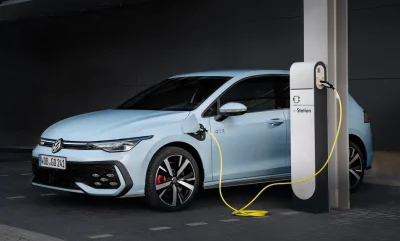
Big future increases to plug-in hybrid company car tax rates are not likely to provoke major changes in Volkswagen’s approach to the vehicles, according to the firm’s UK fleet boss.
Volkswagen has recently introduced several plug-in hybrids, including versions of its Golf, Tiguan, and Passat, with EV ranges of more than 70 miles, which therefore fall into the 5% BIK company car tax band.
Future company car tax rates published with Wednesday’s Budget reveal that this 5% rate, already scheduled to rise to 8% by 2027-28, will then rise to 18% for 2028-29, and 19% for the year after that. This will create more separation from pure EVs, which incur a 2% rate currently, and will be on a 7% rate for 2028-29, and a 9% rate for 2029-30.
Speaking at a Volkswagen media event, the brand’s UK head of direct sales, Owen Shepherd, downplayed the impact of this change.
He said: “We’ve got three years where [plug-in hybrid BIK rates are] still sitting 3% above the EV BIK. I think by the time we get to 2028-29, with where the ZEV mandate is and the inability to use plug-in hybrid credits at that point, we’d have been moving away from plug-in hybrid anyway … because we need to increase the electric threshold through those years to hit the ZEV mandate targets.
“So, I don’t think it’s going to have a massive impact on our plug-in hybrid strategy in the short term. The products are great, from our perspective in terms of the range they provide. They’ve been really, really popular since we launched them earlier this year, particularly in the corporate segment, so there’s a demand out there for them, perhaps for those who aren’t quite ready for the move to full electric just yet but can get used to charging them, seeing what they can do on the electric only range, then the next time around move into full EV.
“We still think there’s a space for them and I don’t think [the Budget] changed that.”
When asked by Business Car if the 5% BIK rate had caused the plug-in hybrids to take sales away from VW’s pure-electric ID cars rather than ICE vehicles, Shepherd said: “I was a little bit worried about that when we launched them, but I don’t think we’re seeing that.
“We’ve not seen a drop off in our ID order take since we launched [the plug-in hybrids], if anything it’s enhanced as well.
“The IDs continue to perform pretty well, particularly with the launch of the Match trims earlier this year, and plug-in hybrid hasn’t really changed the run rate at all on those.”
EV education
Shepherd said that, as with retail customers, there was still an education element needed with corporate or leasing end user drivers about moving to full EVs, and that manufacturers needed to play a part in this.
He said: “We’ve launched a new campaign this quarter called ‘Same spirit, different energy’, which is about trying to normalise that move to EVs, trying to talk about it in language that customers understand, and that will apply equally to fleet customers as it will to retail customers.
“We try to talk to retail customers around EV TCO, and I think end-user [fleet] drivers will pick up on that piece. There’s the company car tax benefit that you get there, but people through their day-to-day lives are looking at becoming more environmentally friendly.”
Shepherd added that work to improve the affordability of EVs could also have an impact.
He said: “We’ve got to work hard as well on the prices of those cars to make it reachable to people at all levels, whether they be corporate drivers, salary sacrifice, or retail drivers, so [VW’s new entry-level EV] the ID. 2 will be a critical part of that.
“We’re bringing out a new ID Pure Match trim for ID.3 that will start at about £32,000 – that will help in terms of improving the affordability and the reach of those cars.”





